Rick Wakeman and The New English Rock Ensemble - Out There (2004)  Video: PAL, MPEG-2 at 5 572 Kbps, 720 x 576 at 25.000 fps | Audio: AC-3 2ch. at 224 Kbps, AC-3 6ch. at 448 Kbps, DTS 6ch. at 755 Kbps
Video: PAL, MPEG-2 at 5 572 Kbps, 720 x 576 at 25.000 fps | Audio: AC-3 2ch. at 224 Kbps, AC-3 6ch. at 448 Kbps, DTS 6ch. at 755 Kbps
Genre: Rock | Label: Classic Pictures | Copy: Untouched | Release Date: 15 Mar 2004 | Runtime: 78 min. | 4,26 GB (DVD5) Progressive rock legend Rick Wakeman and his band bring his 2003 concept album Out
There to the stage in this concert film. Featuring a high-tech
computer-generated light show, Rick Wakeman & the New English Rock
Ensemble: Out There delivers a blend of sound and images that recalls
Wakeman's celebrated works of the 1970s.
Born in Perivale, Middlesex, England, Rick Wakeman's interest in music
manifested itself very early, and from the age of seven on he studied
classical piano. At the age of 14, he joined a local band, Atlantic
Blues, the same year he left school to enroll in the Royal College of
Music. He had his eye on a career as a concert pianist, but Wakeman was
dismissed from the college after it became clear that he preferred
playing in clubs to studying technique.
By his late teens, he was an established session man, playing on records
by such diverse acts as Black Sabbath, Brotherhood of Man, and Edison
Lighthouse. At the end of the '60s, his name also began appearing on the
credits of albums by such artists as Al Stewart and David Bowie, and
one set of sessions with a folk-rock band called the Strawbs led to his
joining the group in 1970. After two albums with the Strawbs, Wakeman
joined Yes, a post-psychedelic hard rock band that had attracted
considerable attention with their first three albums. Wakeman played a
key role in the final shape of the group's fourth record, Fragile,
creating a fierce, swirling sound on an array of electric and acoustic
pianos, synthesizers, and Mellotrons. Fragile was a hit, driven by the
chart success of the single "Roundabout," and Wakeman was suddenly
elevated to star status.
Yes' next album, Close to the Edge, expanded his audience and his
appeal, for his instruments were heard almost continually on the record.
During the making of Close to the Edge in 1972, Wakeman also recorded
his first solo album, an instrumental work entitled The Six Wives of
Henry VIII, which consisted of his musical interpretations of the lives
and personalities of the said six royal spouses. Released early in 1973
on A&M Records, it performed respectably on the charts. Public
reception of Yes' 1974 album, Tales From Topographic Oceans, was mixed,
and the critics were merciless in their attacks upon the record. Wakeman
exited the group before the album's supporting tour. His new solo
album, Journey to the Center of the Earth, adapted from the writings of
Jules Verne and featuring a rock band, narrator (David Hemmings), and
full orchestral and choral accompaniment, was released to tremendous
public response in both America and England, where it topped the charts.
In 1975, his next album, The Myths and Legends of King Arthur and the
Knights of the Round Table, was given a grand-scale premiere at
Wembley's Empire Pool, although it also cost Wakeman a fortune to stage
the event on ice. During this same period, Wakeman began working on film
scores with the music for Ken Russell's Lisztomania, which was a modest
hit.
In 1977, Wakeman returned to Yes, with which he has continued recording
and touring. His solo career continued on A&M into the end of the
'70s, with Criminal Record and Rhapsodies, which were modestly
successful. Wakeman's biggest media splash during this period, however,
came through his alleged role in getting the Sex Pistols dropped by
A&M Records soon after being signed. None of this bothered his fans,
which rapidly expanded to encompass those he picked up through his work
with lyricist Tim Rice on a musical adaptation of George Orwell's 1984,
and his burgeoning film work, which included the music to movies about
the 1976 Winter Olympics and the 1982 soccer World Cup competition.
Additionally, he became a regular on Britain's Channel 4. Wakeman's
audience and reputation survived the 1980s better than almost any
progressive rock star of his era, as he continued releasing albums on
his own label. He also remained associated with Yes into the '90s.
Artists: – Rick Wakeman: Keyboards
– Fraser Thorneycroft-Smith: Acoustic Guitar
– Lee Pomeroy: Bass
– Damian Wilson: Vocals
– Tony Fernandez: Drums, Electronic Drums, Percussion
– Ant Glynne: Guitar
– Fraser Thorneycroft-Smith: Guitar [Additional Solo Guitar]
– English Chamber Choir: Choir
Tracklist: 01. Out There [15:18]
02. The Mission [6:59]
03. To Be With You [7:10]
04. Universe of Sound [8:33]
05. Music of Love [8:07]
06. The Cathedral of the Sky [11:47]
Extra: - 'Out There' The Concert [The story behind the making of the album and the subsequent live tour.]
Features: - Direct Scene Access
- Interactive Menu




 Disponible sólo a los usuarios
Disponible sólo a los usuarios 














